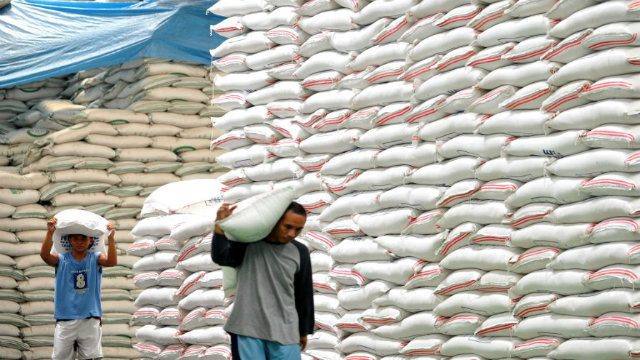SUMMARY
This is AI generated summarization, which may have errors. For context, always refer to the full article.

MANILA, Philippines – National Food Authority (NFA) Administrator Jason Aquino on Wednesday, February 7, clarified there is no rice shortage in the Philippines but admitted that their inventory of NFA rice is running low.
“Walang rice shortage sa buong rice industry. ‘Pag kasi sinasabing rice industry, kasama ‘yung commercial, ‘yung household, tsaka ‘yung NFA. Ang medyo very low ang inventory is the NFA, pero ‘yung commercial natin at household, mayroon pa po, mataas pa. Walang rice shortage,” Aquino said during a press briefing on Wednesday.
(There is no rice shortage in the entire rice industry. When we say rice industry, that includes commercial, household, and NFA. What is very low in inventory is the NFA, but we still have commercial and household stocks, we have a lot. There is no rice shortage.)
When it comes to the NFA rice, Aquino said their total inventory of about 1.2 million bags will last for only 35 days, given the distribution rate of 34,000 bags daily. The NFA even had to reduce the distribution from 64,000 bags to 34,000 bags because of “depleting stocks.”
“We had to judiciously allocate our remaining stocks to give priority to the victims of calamity, the depressed areas, and the island provinces and municipalities in the country,” the administrator explained.
He said they cannot buy from farmers because their buying price, P17 per kilogram, is much lower than farmgate prices which range from P19 to P22 per kilogram.
They recommended raising their buying price from P17 to P22, but “unfortunately we remain at P17,” Aquino noted.
Another mode of replenishing their buffer stock is through importation, but Aquino lamented that the NFA Council has not yet approved the importation of 250,000 metric tons of rice.
Aquino said they requested for the authority to import this much rice as early as November 2017.
Asked why the council has not yet given its approval, Aquino answered, “Maybe they have other reasons, but basing do’n sa council meeting namin last time, ang sabi nila, there’s no need for NFA to import kasi mataas pa naman ‘yung inventory ng bigas sa commercial.”
(Maybe they have other reasons, but based on our council meeting last time, what they said was, there’s no need for the NFA to import because we have enough inventory of commercial rice.)
Even if the NFA Council gives its approval today, Aquino said the importation would take another 45 days, which means there would be a “vacuum” of NFA rice for 10 days.
“Today, we have sought the assistance of our rice retailers and businessmen in making the situation more bearable to our consumers. Through their commitment of support, they have pledged to do their best to make rice available and affordable to all,” Aquino said.
The Grain Retailers’ Confederation of the Philippines (Grecon) met with Aquino on Wednesday and assured it will help in ensuring the stability of rice supply and prices in the market.
“We assure that any price increase, as a result of the new tax reform law, will be limited to the barest minimum,” Grecon said in a statement.
The NFA is required to keep a 15-day buffer stock at any given time, and a 30-day buffer stock by July 1 or the start of the lean months. Currently, the NFA sells regular-milled rice at P27 per kilogram, and well-milled rice at P32 per kilogram.
Senate committee on agriculture chairperson Cynthia Villar on Tuesday, February 6, already filed a resolution calling for an investigation into the shortage of NFA rice in the country.
Earlier on Wednesday, rice watchdog group Bantay Bigas slammed the NFA for “raising false alarm for a shortage to justify more importation.”
“NFA is importing more rice than buying local palay, thus, it is already acting as a broker for imported rice, instead of working towards ensuring food security in the country,” Bantay Bigas spokesperson Cathy Estavillo said in a statement.
According to the group, this “import-dependent” policy “undermines” the country’s food security. They called on the NFA to increase its procurement from local farmers, as well as its buying price.
“President Duterte should watch closely this issue, as hungry people are angry people and he would not want that to be directed against him, for worsening the situation by further liberalizing the rice industry and agricultural sector,” Estavillo added. – Rappler.com
Add a comment
How does this make you feel?
There are no comments yet. Add your comment to start the conversation.